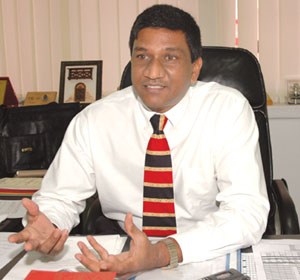|
dailynews |
|
|
|
|
|
OTHER LINKS |

|

|

|
Profit plus purse - easy fuel, CPC's prime priority
Cheaper, purse-easy fuel which would ease the financial burden on the consumer is Ceylon Petroleum Corporation Chairman Ashantha de Mel's number one priority. Increasing profits is certainly desired by CPC, but it would not like to amass excessive profits at the expense of the people, de Mel explains in this interview, where he outlines his future plans for Sri Lanka's premier fuel supplier: Q: What are your immediate priorities as Head of Ceylon Petroleum Corporation? A: What is immediately required is to find out how CPC operates and to bring the necessary disciplines into the Corporation. I also intend to find ways and means of bringing some benefits to the people. We need to find out how we could reduce the price of fuel and buy it in a better way. Buying fuel cheaper is also an urgent necessity. We need to find ways and means of preventing too heavy a burden from falling on the people when fuel prices rise. When the prices increase we should be in a position to provide fuel cheaper to the people. We are also looking at ways of buying fuel cheaper. At the moment we are buying fuel in the spot market. This proves expensive. We need to go in for a mid-term contract where we could obtain fuel on credit terms and at discounted prices. This is also something we are looking at. I have just got started off in this job and am trying acquire a grasp of things. Q: Have you got a formula in mind wherein you could obtain some relief for the consumer? A: There are numerous ways in which we could reduce costs in the importation process. We could, for instance, use our Muthurajawela facility. Bringing the fuel to Muthurajawela reduces the cost by 30 cents per litre, than bringing it through the Port. At the moment we are bringing fuel in the form of diesel and kerosene to Muthurajawela. So, in that part of it we are making a saving. But since there are no pipelines between Muthurajawela and Kolonnawa, we cannot bring in petrol, because we don't have tanks for petrol at Muthurajawela. We are trying, therefore, to establish a pipeline between Muthurajawela and Kolonnawa. We are at he moment doing a concept paper on this and hope to do a feasibility study. If we get these two places connected, bringing in fuel becomes cheaper. Because in bringing fuel to Muthurajawela you do not have to pay the three dollars per metric tonne which is required as port charges. These are not applicable in Muthurajawela. Also in Muthurajawela there is a cost involved. If you don't use it costs are incurred. It is a fully computerized 29-tank facility. We are trying to modernize this facility and if we get the connection between Muthurajawela and Kolonnawa, we could use it to the maximum. We are looking at reducing freight costs. We are looking at better freight terms to reduce costs. We are also exploring means of buying the fuel cheaper. At the moment we are buying through third parties. I am meeting the Reliance people who have come down from India and also intend talking to the Treasury. Most of the tenders have gone to Reliance but we are buying fuel through on agent in Sri Lanka. We are trying to go directly to Reliance and intend asking them whether they could give us a cheaper price. We also intend asking Reliance whether they could give as some easier credit terms. That will help us in our foreign exchange. Because when we buy in the market, the rupee goes up with the dollar. We could control that too if we get better terms. We are also trying to bring down our costs. Because the burden of all our extra costs are going to the people. So, if we could bring down our costs, there is a possibility of selling fuel at a cheaper price. That is our basic aim. Q: Have you any plans for developing CPC into a consistently, financially viable institution? A: We do about 700 million rupees in sales everyday. But the sales are monitored only at the end of the month. They come in a batch. There is no day-to-day processing. At a particular time during the day, you cannot say how well you are faring because the computer is not updated on a daily basis. We are looking to resolve this problem. We are seeking to acquire greater control over our operations and are aiming at improving our financial viability. There is a lot to attend to at the moment and I am trying to prioritise them. Muthurajawela is certainly a priority. I am trying to get this pipeline done, get fuel at cheaper prices and reduce trade costs and am also trying to improve our computer system. CEB was one of our biggest customers and we had some difficulty in recovering our dues. But now CEB has decided to open an LC on its own and that burden is also not on us. I have also managed to increase the charges made by us from Airlanka. They were obtaining fuel at a much lower rate than other airlines. Now that burden is off our shoulders. So we are seeking to make CPC financially viable. On the other hand, we do not intend making excessive profits while taxing the people. We want it to be in between; where we make a reasonable profit and also give the people some sort of benefit. |









